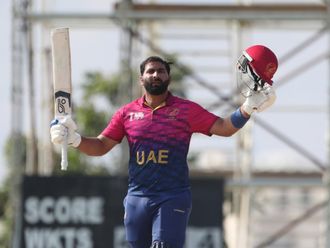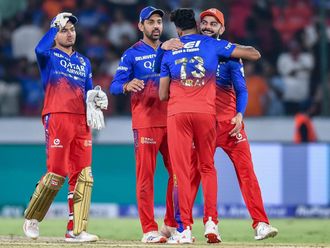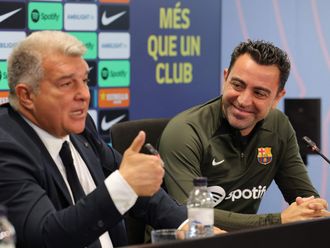Dubai: The day before the 2013 final of the International Cricket Council (ICC) Champions Trophy between India and England, the ICC organised a media get-together at the Edgbaston ground in Birmingham to bid goodbye to the wonderful tournament forever.
A video made with soundbytes from journalists’ from around the world who had reported on the Champions Trophy over the years was played on the screen during the function. All journalists were unanimous that they would miss the tournament, which made its debut as a mini World Cup. The tournament was expected to be replaced by a World Test Championship but, fortunately, better sense prevailed and ICC decided not to cancel a tournament that had won the hearts of fans whenever it was staged.
The beauty of this tournament is that it is the best eight teams that have qualified to play in this event and it decides the champion in just over two weeks, unlike the World Cup, which runs for over 45 days. The event has come a long way after it began as ICC knockout tournament in 1998. In that edition, all the 10 ICC members competed and it used to be held biennially. It was in 2002 that the name was changed to Champions Trophy and in 2009 it was decided that only top eight One Day International teams will play in it based on the rankings six months before the tournament.
The first edition of the tournament was held in Bangladesh in 1998. Interestingly, Bangladesh could not participate in the tournament despite being the hosts as they were yet to be a Test playing nation. The ICC staged the event in Bangladesh mainly to promote the game in that nation, thanks to the initiative of Jagmohan Dalmiya, the then president of the world governing body.
South Africa emerged as champions defeating West Indies by four wickets, the only major ICC tournament that South Africa had won before being labelled as ‘chokers.’
The ‘98 final saw Jacques Kallis bag five West Indies wickets for just 30 runs to restrict West Indies to 245 runs despite opener Philo Wallace’s knock of 109. The late Hansie Cronje spearheaded the Proteas’ chase with a top score of 61 runs as over 40,000 people turned up to watch the final at the Bangabandhu National Stadium in Dhaka.
The second edition was held in Nairobi, Kenya, another non-Test playing country, in 2000. The final won the hearts of the fans with India posting 264 for six against New Zealand thanks to skipper Sourav Ganguly’s superb 117 and Sachin Tendulkar‘s 69 runs. The Ganguly-Tendulkar opening partnership made 141 runs in just 26 overs, but India lost out to the individual brilliance of Chris Cairns, who cracked a breezy 102 to hand New Zealand their only win in an ICC tournament.
After the first two editions, cricket fans eagerly began to wait for this event held only every two years. Sri Lanka stepped forward to stage the event in 2002. Unfortunately, the final was marred by rain with Sri Lanka playing 50 overs and when India started the chase, rains stopped play just after two overs. The next day, instead of continuing from where it ended as per the tournament rules, a fresh contest was held with Sri Lanka again batting 50 overs the next day and India getting to play only eight overs before rain stopped play again.
Joint winners
Thus, despite 110 overs being played, there was no result and both the countries were declared joint winners. That tournament saw Virender Sehwag in sublime form, scoring 271 runs.
In 2004, the Champions Trophy produced one of the most thrilling finals. England posted 217 and West Indies slipped to 147 for 8 before West Indies’ lower order batsmen Courtney Brown and Ian Bradshaw figured in a memorable rearguard action to take the match by two wickets.
When India staged this event in 2006, the popularity of the tournament reached its peak with most matches seeing sell-out crowds. The first news one had to report on arrival in Jaipur was about Pakistan fast bowlers, Mohammad Asif and Shoaib Akhtar, being sent home the day before the first match after testing positive in a drug test.
Third-time hosts
In the final at Brabourne Stadium in Mumbai, Australia won the Champions Trophy for the first time defeating West Indies by eight wickets. West Indies, who were 49 for no loss in five overs, crashed to left-arm pacer Nathan Bracken who took three quick wickets and Australia won by eight wickets.
In the 2009 edition in South Africa, Australia won again defeating New Zealand by six wickets. Shane Watson cracked an unbeaten 109 in the final. This tournament was to be held in 2008 in Pakistan but most countries refused to travel to Pakistan for security reasons.
England became the only country to host the Champions Trophy twice in 2013. Rain delayed the start and the final was reduced to 20 overs each side, where India defeated England by five runs.
England will now host the event for the third time, but the West Indies team is absent as they did not qualify with Bangladesh marking their return to the event after their last appearance in the 2006 edition 11 years ago. The question in everyone’s mind is: will 2017 produce a new champion or can hosts England be third time lucky in a final?










